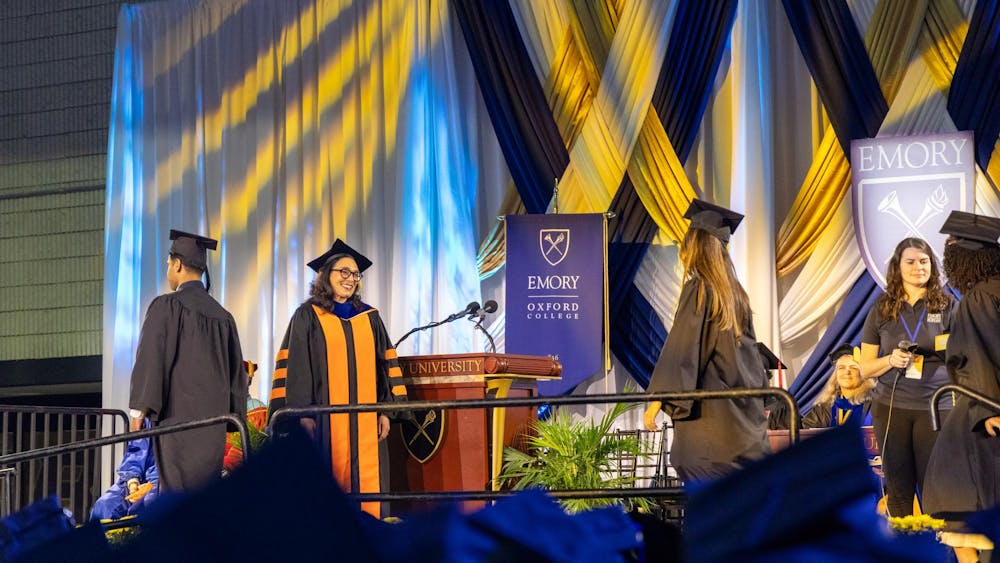Hillary Schneller, a senior staff attorney at the Center for Reproductive Rights and the co-lead counsel in Dobbs v. Jackson Women’s Health Organization, discussed the ongoing Supreme Court case and her fight for reproductive rights in a dialogue hosted by the Emory Law Chapter of the American Constitution Society on April 4. Before a crowd of about 25 students, Schneller outlined the case’s legal underpinnings, emphasizing the harmful effects of restricting abortion access.
In the Dobbs case, the Supreme Court is considering a Mississippi law that bans abortions after 15 weeks except in cases of medical emergency or fetal abnormality, directly challenging the precedent set by Roe v. Wade and Planned Parenthood v. Casey. The court, currently composed of a conservative supermajority, could potentially undermine or overturn the Roe ruling in their decision on the Dobbs case.
The Supreme Court heard oral arguments for the case in December 2021, and will form a decision before the court’s term ends in June 2022.
The event was structured in a question and answer format. Incoming president of the Emory Law School American Constitution Society Nick Smith (23L) introduced Schneller, and the incoming vice president Andrew Sykes (24L) overviewed the relevant legal history preceding the Dobbs case, highlighting the decisions of Roe v. Wade (1973), Planned Parenthood v. Casey (1992), and Whole Woman's Health v. Hellerstedt (2015). Moderator Alyssa Rogowski (23L), the outgoing president, led with several questions before opening up the discussion to all attendees.
In her responses, Schneller outlined four legal arguments that shaped the Center for Reproductive Rights’ case: that upholding the Mississippi ban would degrade the court’s legitimacy, overturn Roe, worsen gender inequality and cause harm and chaos for Americans.
Undermining decades of precedent affirming Roe would decrease the integrity and legitimacy of the court in the eyes of the American public, Schneller said.
“The court’s standing in the country matters to them,” Schneller said. “It should because that is where they get their power.”

Next, Scheller argued that there is no middle ground between upholding Mississippi’s ban and overturning Roe. Because the central holding of Roe and Casey is that states cannot ban abortions before viability — which is around 23 to 24 weeks — Schneller said that if the court upholds the fifteen week ban, they have overturned Roe.
The Center for Reproductive Rights’s third major argument centers on gender equality, contending that abortion access fufills the right to liberty and privacy.
“One of [Mississippi’s] primary arguments is that women no longer need access to abortion because we have achieved this ideal world of gender equality,” Schneller said. “I’m not exaggerating, you can see their briefs.”
Discussions of gender equality also intersect with issues of racial equity, Schneller added. She cited Mississippi’s startling infant and maternal mortality rates, which are especially high among people of color.
In addition, Schneller mentioned an amicus brief by leading economists which shows that much of women’s progress over the past 50 years has resulted from abortion access, further illustrating how abortion access promotes gender equality.
Schneller’s conclusionary argument was that upholding the abortion ban and overturning Roe would unleash “chaos and harm” upon the country. However, she added that many people do not recognize this possibility.
“I think that it is hard to convince the Supreme Court justices, who live in a different world, of the practical harm [restricting abortion access] would cause,” Schneller said.
Schneller called Mississippi’s argument to turn the issue of abortion to the states “disingenuous,” noting that overturning Roe would trigger abortion bans in many states and harm Americans.
She suggested students reference the Center for Reproductive Rights’ “What if Roe Fell” map to see the status of abortion rights in states if Roe were overturned.
The ongoing six week abortion ban in Texas by Senate Bill (SB) 8 provides a preview of the turmoil that could ensue from the overturning of Roe, Schneller said. She added that SB 8 deputizes private citizens to enforce the ban and has removed access to safe, legal abortion for many women who do not know they are pregnant by six weeks.
In addition, Schneller admitted that the Supreme Court’s refusal to block SB 8 on procedural grounds sends “bad signals” for their consideration of the Mississippi law on its merits.
“I’ve been doing this for over 10 years and it feels really different now — it feels less hopeful,” Schneller said.
However, Schneller expressed confidence in the Center for Reproductive Rights’ arguments and stressed the importance of not giving up in the fight for reproductive rights.
“We have to believe we can win to do this work,” Schneller said.
She added that if the clinics she represents can persist, so can she.
In response to a student question about limits of legal recourse given the judiciary’s current conservative tilt, Schneller said she believes there is still a role for lawyers in the fight for abortion rights. She highlighted her work fighting off abortion restrictions at the state level, which will help mitigate the short term damage if Roe is overturned. For example, the Center for Reproductive Rights and the American Civil Liberties Union successfully argued in Febuary against a Montana law prohibiting advanced practice nurses from performing abortions.
“Those are very hopeful cases to work on, ” Schneller said.







